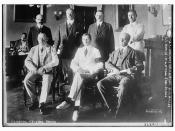Concern for Self-exclusion A well-known reporter for The Times Educational Supplement, Elaine Williams speaks of the concern and stability for young girls enrolled in school. In her article "Girls who give up", Williams reveals personal encounters of exclusion from girls who attend pupil referral units. Through stereotyping, escaping peer problems, and lacking teacher involvement, Williams identifies many points in which girls may consider not attending school and failing to receive an education.
Williams acknowledges stereotyping as a factor in which exclusion of girls may exist. Many people stereotype that they detect more males excluding themselves from school than females because females tend to be "[â¦] more articulate, more mature [â¦]" (Williams 22). The Joseph Rowntree Foundation reports "[â¦] that boys are more than 10 times more likely to be excluded from primary school than girls [â¦]" (Williams 22). However, Williams emphasizes that "[i]n Wales," more absentees are present when girls miss "10.6
percent [of] half-days" compared to "10.4 percent of boys" (Williams 22). Consequently, Williams provides good arguments that stereotyping of male exclusion is false and the dishonesty may lead to more cases of female exclusion.
Secondly, exclusion by girls is also introduced by Williams as an act of escaping peer relationships. Williams speaks of interviews with girls who reveal their problems with peers. Emma, an untraditional student, expresses that "[she] was getting called fat and everything and other pupils would swear at [her]. [â¦]" (Williams 22). Thus, many girls find themselves choosing to drop out of school instead of facing their problems. At the King's Center in Birmingham, Williams states that the center feels that it is not a peer problem, yet girls just do not want to be around trouble or the "wrong crowd". Some people believe that peers can cause conflicts in school; however, girls should not quit and lose an opportunity to achieve a higher education. Accordingly, Williams justifies that girls who drop out of school begin the cycle of "young mothers of the next generation [â¦]" (Williams 22).
Even though Williams clarifies that stereotyping and escaping peer relationships are two reasons of exclusion, girls have also revealed their absentees from school because of the lack of teacher involvement. Liz, one of Williams' interviewers, states that "[teachers] did [not] understand and they did nothing. [â¦] They do [not] pay much attention to what [is] going on between girls [â¦]" (Williams 22). Williams uses strong arguments to disclose that many teachers were not supportive and understanding; nevertheless, Williams also reveals that there were some teachers who were trying to make a difference. Lotty, another one of Williams' interviewers from the Scarborough unit, makes known that "[her teacher] use to say, 'I know you can do it'. He was strict but he was fair." (Williams 22). Therefore, many people strongly agree with Williams that some teachers may or may not contribute to girls prohibiting themselves from school.
Through out the article "Girls who give up", Williams presents many significant personal encounters and strong arguments that bring about the dishonesty in stereotyping. Moreover, she uses brilliant approaches to reveal that girls may withdraw themselves from school because of peer problems and the lack of teacher involvement. Thus, Williams uses her article to open up the eyes of readers and to encourage readers to make a change and to prevent the problem of exclusion.

![[Portrait of Imogene Coca, Mary Lou Williams, and Ann Hathaway, between 1938 and 1948] (LOC)](https://s.writework.com/uploads/9/91750/portrait-imogene-coca-mary-lou-williams-and-ann-hathaway-be-thumb.jpg)
![Williams [and] Young Britt (LOC)](https://s.writework.com/uploads/3/32760/williams-and-young-britt-loc-thumb.jpg)

![[Portrait of Imogene Coca, Mary Lou Williams, and Ann Hathaway, between 1938 and 1948] (LOC)](https://s.writework.com/uploads/3/31338/portrait-imogene-coca-mary-lou-williams-and-ann-hathaway-be-thumb.jpg)
